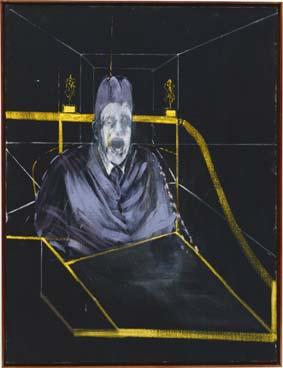From El Greco to Dali
dal 26/2/2003 al 18/5/2003
Segnalato da
26/2/2003
From El Greco to Dali
National Museum, Stockholm
What has been the importance of older Spanish painting for artists from the 19th century until the present time? The exhibition commences with a presentation of Spanish painting from the 16th to the 19th century and continues by showing the legacy, both in style and motif, left by the art of that time.

A dialogue with Spanish painting
What has been the importance of older Spanish painting for artists from the 19th
century until the present time? That question is addressed in a Nationalmuseum
exhibition, From El Greco to Dali: A dialogue with Spanish painting, which opens
on 27 February 2003.
The exhibition commences with a presentation of Spanish painting from the 16th
to the 19th century and continues by showing the legacy, both in style and
motif, left by the art of that time. Nationalmuseum's own collection has been
supplemented by a number of important loans. For the first time, the museum is
putting on display its own The Apostles Peter and Paul by El Greco alongside a
painting with a similar motif from the Hermitage in St. Petersburg.
There is a presentation of the unique style of Spanish still lifes in a few
expressive works from the 17th and 18th centuries by artists such as Zurbarán,
Bartolomé Péréz, Juan van der Hamen y Léon, Meléndez and Goya. Goya is seen to
be an important revitalizing force for the genre.
Spanish portraiture is exemplified by the museum's own paintings as well as by
two borrowed portraits by Velázquez, one of the little Infanta Margarita Teresa
and the other of Francisco Lezcano, a court dwarf to the Spanish royal family.
In both paintings, the artist reaches deep into the human psyche and the
connection between social position and inner character.
The exhibition presents recent research on Nationalmuseum's own collection of
older Spanish painting, master drawings, etchings and sculpture. Studies of
signatures and other technical analysis are presented. The museum's own
interesting although currently small collection of master drawings by, among
others, Juan de Juanes, Alonso Cano and Goya is also on display, together with a
number of polychrome wooden sculptures from 16th and 17th century Spain. Several
of these works have never been shown in Sweden.
Many 19th-century artists found inspiration in Spanish art and culture, Sweden's
Ernst Josephson and Anders Zorn among them. One example is Josephson's painting
of a Spanish dwarf, done in Seville. But which are the Spanish 'masters' who
have provided inspiration to artists from the 19th century on? A number of
figures are revealed as especially influential: El Greco, Velázquez and Goya,
but also Zurbarán and Meléndez. Among the free paraphrases of older Spanish
painting seen in the 20th century are Picasso's many variations on Velázquez's
famous Las Meninas from 1656 - Picasso was inspired to recreate the motif about
40 times. Francis Bacon also painted several canvases inspired by the Velázquez
portrait of Pope Innocent X, in which Bacon focused on the inner existential
drama and various emotions. Among free interpretations and paraphrases are
Antonio Saura's work based on a motif in Velázquez's The Crucifixion from the
Prado and Nationalmuseum's version of Veronica's sudarium by Zurbarán.
Image: Francis Bacon(1909-1992) Number VII from Eight Studies for a Portrait, 1953 Oil on canvas 152,3 x 117 cm
Museum of Modern Art, New York
The exhibition Impressionism and the North was a great success at the National
Museum of Fine Arts in Stockholm and attracted 226,964 visitors. It will open again at Statens Museum for Kunst in Copenhagen
February 21.
NATIONALMUSEUM
Södra Blasieholmshamnen
Phone +46 8 5195 4300, fax +46 8 5195 4436



